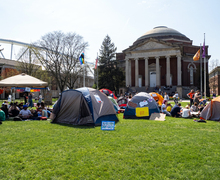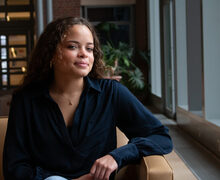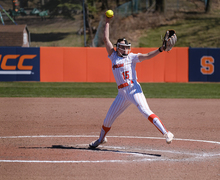SU students apathetic toward presidential primary elections
Maxine Brackbill | Photo Editor
One on-campus polling place for Tuesday’s presidential primaries was in Huntington Hall. Several students said they were frustrated with the university's lack of student voting programs.
Get the latest Syracuse news delivered right to your inbox.
Subscribe to our newsletter here.
Many Syracuse University students, several of whom are first-time voters, did not cast their vote in Tuesday’s presidential primary election, citing frustration with candidates and a lack of university communication about the election.
New York had a low voter turnout statewide with only about 5.1% of New York’s registered Democrats and about 5.8% of New York’s registered Republicans casting their ballots in Tuesday’s election, including early voting, according to preliminary results from the state’s Board of Elections.
Nearly 12% of Democratic primary voters left their ballots blank to send a “clear message” to Biden to “stop the genocide in Gaza,” according to a release from Leave it Blank NY. In New York’s 22nd district, which encompasses Syracuse, only 6.8% of Democratic voters left the ballot “blank” — among the lowest in the state, according to City & State New York.
This year’s ballot was headlined by incumbent Joe Biden and former President Donald Trump, both of whom “easily” won the primary, according to the Associated Press. Most of the other candidates who were on the ballot, such as Nikki Haley and Dean Phillips, have dropped out of the race, according to The New York Times.
Although several students said they were not voting in the primaries Tuesday, most expressed that they planned to vote in other upcoming elections, including the New York primaries on June 25 and the general elections on Nov. 5. Although they plan to vote, most indicated concerns and frustration with the candidates on the ballot.
Christopher Davis, a sophomore magazine, news and digital journalism major, said he will be voting in the November elections despite being “disappointed” with the candidates.
“I’m not satisfied with our candidates,” Davis said. “Both candidates right now just don’t have the best interest of our people and I think there’s a lot of broken promises.”
As a registered independent, Carlo Pisacane, a junior studying computer science, said he is unsatisfied with this year’s presidential candidates but said he will be voting in the November general election for who he considers a “lesser evil.” He said, despite his reservations about the candidates, it is important to vote for president.
Nate Harrington, a second-year creative writing and magazine, news and digital journalism major, said neither candidate represents a “majority” of the country’s opinion, saying voters are just “settling.” Similarly, Arieza Maglalang, a freshman majoring in anthropology, said voters have to choose a candidate based on avoiding harm.
“In terms of politics, I feel like we’re at a position where it’s basically just picking between who’s a lesser of two evils,” Maglalang said. “It’s mostly like who’s not going to screw us over.”
Students also expressed various issues, such as gun control, educational reform, the environment and LGBTQ+ rights, as their motivation for wanting to vote in upcoming elections. The most prevalent issue that students cited as a motivation was reproductive rights, especially as states across the country limit access to abortion and reproductive healthcare in the wake of the Roe v. Wade decision.
Students mainly emphasized disappointment in the lack of ethics they had seen from the two candidates.
“We’re lacking good leaders and, in general, being a good person is important,” said Ben Martin, a sophomore studying advertising and entrepreneurship. “I’m not really seeing that in these leaders so I want to vote to have more humanity and ethics in office.”
Information about local upcoming elections, voter registration and polling locations can be found by going to the county’s Board of Elections website, Onondaga County Board of Elections Democratic Elections Commissioner Dustin Czarny said. On the website, new voters, including SU students, can access direct links to register to vote and request absentee ballots to anywhere in New York state.
Paloma Valderrama, a sophomore studying architecture at SU, did not vote in the elections Tuesday because she said she doesn’t know how to register to vote.
“I was born here but I did not grow up here, so I have no clue how to do it and I just don’t have time to figure it out,” Valderrama said.
Valderrama’s struggles with accessing information about voter registration and the primaries are not isolated. Czarny said the issue with students’ lack of knowledge on voter registration is because they don’t know where to look.
Several students, including those registered to vote, said they were not going to vote in the presidential primaries because they were not aware the elections were taking place Tuesday, with some pointing out they had not received any emails or seen anything on-campus from the university about the presidential primaries.

Cole Ross | Digital Design Editor
There were two polling locations on SU’s campus for Tuesday’s election in Goldstein Student Center and Huntington Hall, according to the Onondaga County Board of Elections.
Martin, who voted by mail to his hometown in Arlington, VA, said SU can “do better,” as tabling is the only initiative he said he has seen on-campus to increase voter registration and participation.
“If (SU) can spend millions of dollars on building new dorms, they can spend money on having an event to get all students to vote,” Martin said.
Similarly, Harrington said there were no resources through SU that he knew of and he was “most definitely on his own” while looking for information on voting. He suggested the university should consider having voter information readily available in busy campus locations like Bird Library.
There is information and resources on voter registration, absentee voting, upcoming elections and polling locations on SU’s Office of Government and Community Relations website.
Alaa Elhussen said she believes SU has done a good job disseminating information on voter registration but only to students in majors related to political science and government. Elhussen said SU should aim to make voting information more “accessible” to students with majors who may not have as much exposure to civic education, such as those in STEM majors.
Beyond concerns over access to voter and election information, various students also pointed to anxieties over the prevalence of bias and misinformation. Martin said these concerns have only been heightened with the amount of students who use social media as a news source.
Approximately half of United States adults get news “at least sometimes” on social media, according to a November 2023 study from Pew Research. Martin said this can be problematic because social media is often plagued by misinformation and bias.
Lily Klein, a junior studying psychology and forensic science, said bias will be an issue this election season.
“Finding unbiased sources is a challenge because everything is so biased and there’s a lot of wrong information out there and false news,” Klein said. “So it’s going to be hard to navigate that.”
Czarny said it is “crucial” that young voters register and show up to the polls this election year.
“If this generation participates at anywhere near the equal rates of the other generations, you outnumber the other generations,” Czarny said. “Your voice can really play a part in any election and if you are consistently voting, the politicians must and shall listen to you.”
Published on April 4, 2024 at 1:01 am
Contact Samantha: saolande@syr.edu





